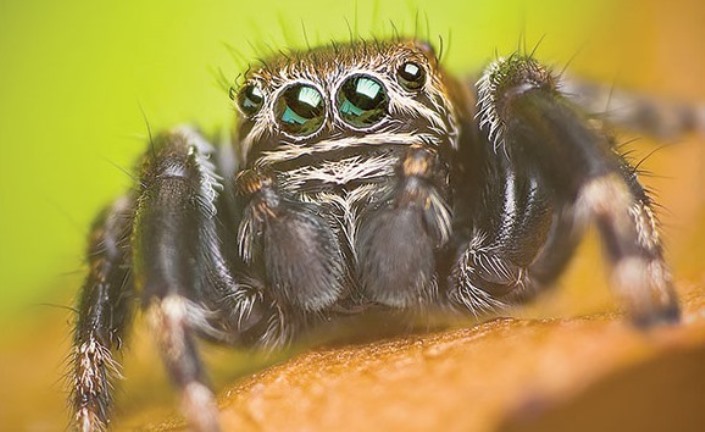
Scientists studied baby jumping spiders like the one above. They wanted to see if the spiders sleep. (LUKAS JONAITIS, CREATIVE COMMONS)
Are you afraid of spiders? Do they keep you awake at night?
Daniela Roessler studies spiders. She isn’t scared of them. But one question kept her awake at night. Do spiders sleep?
She set out to find an answer.
Signs of Sleep
Roessler works in Germany. One night, she was in the lab. She saw jumping spiders hanging from threads of silk in their containers. She thought the spiders might be sleeping.
“It was just the most unusual thing I’ve ever seen,” she said.
Roessler and her team got ahold of some baby jumping spiders. That’s the same kind of spider Roessler saw in her lab.
The spiders are brown and furry. They have four pairs of big eyes. Babies have a see-through outer layer that makes them easy to study.
Are They Dreaming?
The team recorded the baby spiders at night. The videos showed a pattern. The spiders’ legs twitched. Parts of their eyes moved.
That sleeping pattern happens during REM sleep in humans. REM stands for “rapid eye movement.” "Rapid" means fast.
REM is an active part of sleeping. Parts of the brain are very busy. The body and eyes twitch. REM is connected to dreaming.
Other birds and mammals are known to go into REM sleep. Dogs and cats twitch in their sleep. But experts haven’t studied REM sleep in jumping spiders before.
All About the Eyes
The spiders’ movements also repeated in ways that they do with humans in REM sleep.
Many insects don’t have eyes that move. That makes it hard to study REM sleep. But jumping spiders are hunters. They can move their eyes around when they hunt.
The team didn’t prove that spiders go into REM sleep. They could be resting but not sleeping. More tests are needed to know for sure.
A Web of Questions
Experts still have many questions about REM sleep. How common is it? What purpose does it serve?
Proving that spiders go into REM sleep would be very exciting, said bug expert Barrett Klein.
Vocabulary
-
unusual
adj. not common or expected -
twitched
v. made small, uncontrolled movements -
mammals
n. animals that feed milk to their young and that usually have hair or fur covering most of their skin











Leave a comment
Load more